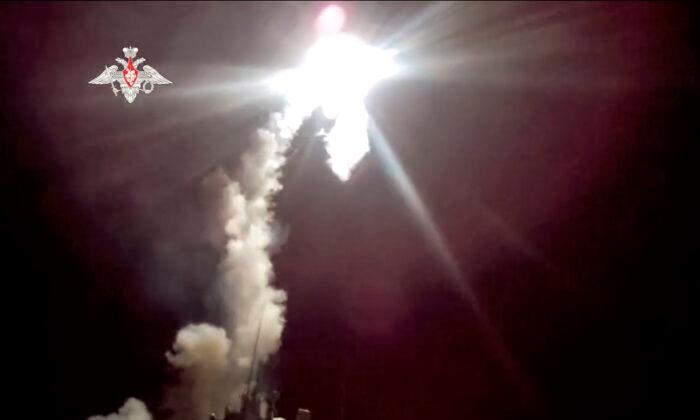The United States said it tested a hypersonic missile successfully for the second time, just weeks after Russia’s Defense Ministry said it fired such a weapon in Ukraine.
“This Lockheed Martin HAWC flight test successfully demonstrated a second design that will allow our warfighters to competitively select the right capabilities to dominate the battlefield,” HAWC program manager Andrew Knoedler said in a statement. “These achievements increase the level of technical maturity for transitioning HAWC to a service program of record.”
The vehicle containing the hypersonic missile was released via a carrier aircraft and was “boosted to its Aerojet Rocketdyne scramjet engine ignition envelope,” which “quickly accelerated to and maintained cruise faster than Mach 5 (five times the speed of sound) for an extended period of time.”
It then reached altitudes greater than 65,000 feet and flew for more than 300 miles, said DARPA’s news release.
“We are still analyzing flight test data, but are confident that we will provide the U.S. Air Force and Navy with excellent options to diversify the technology available for their future missions,” Knoedler added.
Lockheed Martin was given a nearly $1 billion contract with DARPA to develop its HWAC system, which can, according to the release, be used for land attacks. However, the firm proposed a similar system to the U.S. Navy to make maritime strikes or to be carried by the F-35C stealth fighter, according to reports.
While DARPA’s news release did not make mention of the Russia-Ukraine conflict, Russian officials in March claimed they used hypersonic missiles against Ukrainian targets. President Joe Biden in late March stated that such weapons were used, adding that it is a “consequential weapon.”
“They’ve just launched their hypersonic missile because it’s the only thing they can get through with absolute certainty,” Biden said. “It doesn’t make that much difference except it’s almost impossible to stop it. There’s a reason they’re using it.”
Amid the conflict, the Pentagon confirmed last month that it canceled a scheduled test of an intercontinental ballistic missile, or ICBM, to avoid escalating tensions with Russia.





